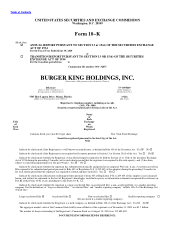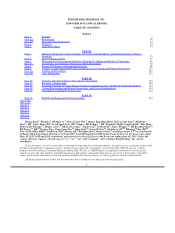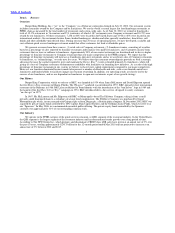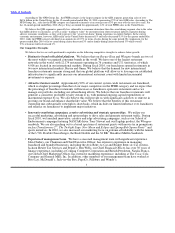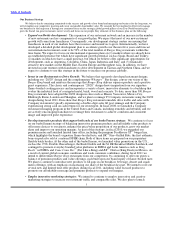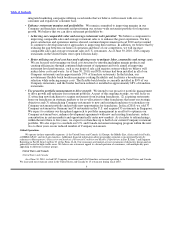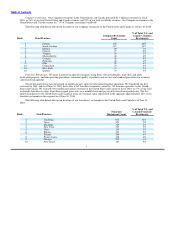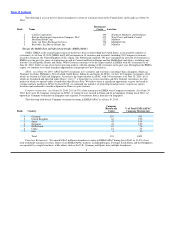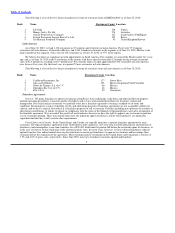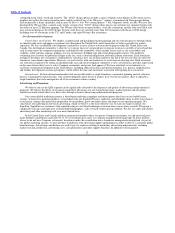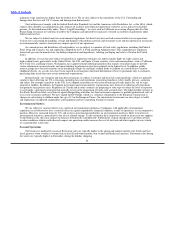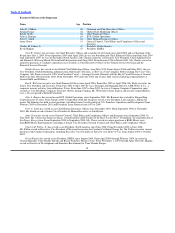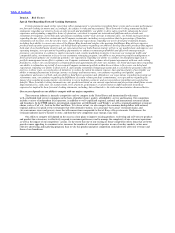Burger King 2010 Annual Report Download - page 12
Download and view the complete annual report
Please find page 12 of the 2010 Burger King annual report below. You can navigate through the pages in the report by either clicking on the pages listed below, or by using the keyword search tool below to find specific information within the annual report.
Table of Contents
agreements renewed in the United States generate royalties at the rate of 4.5% of gross sales for the full franchise term. The weighted
average royalty rate in the United States and Canada was 3.9% as of June 30, 2010. In addition to their royalties, franchisees in the
United States and Canada are generally required to make a contribution to the advertising fund equal to a percentage of gross sales,
typically 4.0%, on a monthly basis.
International. Internationally, we typically enter into franchise agreements for each restaurant with an up front franchise fee of
$50,000 per restaurant and monthly royalties and advertising contributions each of up to 5% of gross sales. However, in many of our
international markets, we have granted either master franchise agreements or development agreements that provide franchisees broader
development rights and obligations. In each of Australia and Turkey, we have entered into master franchise agreements with a
franchisee in each country which permits that franchisee to sub−franchise restaurants within its particular territory. In New Zealand and
certain Middle East and Persian Gulf countries, we have entered into arrangements with franchisees under which they have agreed to
nominate third party franchisees to develop and operate restaurants within their respective territories under franchise agreements with
us. As part of these arrangements, the franchisees have agreed to provide certain support services to third party franchisees on our
behalf, and we have agreed to share the franchise fees and, in some cases, royalties paid by such third party franchisees. We have also
entered into exclusive development agreements with franchisees in a number of international markets that typically either (1) grant the
franchisee exclusive rights to develop restaurants in a particular region and contain growth clauses requiring franchisees to open a
minimum number of restaurants within a specified period or (2) grant the franchisee a right of first refusal before any other franchisee
can open a restaurant in a particular region. In addition, we have invested in joint ventures with franchisees to drive development in
Taiwan and Northern China, and we expect to continue to use this strategy in the future to increase our presence globally.
Franchise Restaurant Leases. Unlike some of our competitors, we typically do not own the land or the building associated with
our franchise restaurants and our standard franchise agreement does not contain a lease component. Rather, to the extent that we lease
or sublease the property to a franchisee, we will enter into a separate lease agreement. For properties that we lease from third−party
landlords and sublease to franchisees, leases generally provide for fixed rental payments and may provide for contingent rental
payments based on a restaurant’s annual gross sales. Franchisees who lease land only or land and building from us do so on a “triple
net” basis. Under these triple net leases, the franchisee is obligated to pay all costs and expenses, including all real property taxes and
assessments, repairs and maintenance and insurance. As of June 30, 2010, we leased or subleased to franchisees 981 properties in the
United States and Canada and 95 properties in EMEA, primarily sites located in the U.K. and Germany. These properties represented
approximately 15% and 4%, respectively, of our total franchise restaurant count in such regions. We do not own or lease any properties
to franchisees in APAC or Latin America.
Product Offerings and Development. Our barbell menu strategy of expanding our high−margin premium products and our value
products and our goal of expanding the dayparts that we serve are the core drivers of our product offerings. During fiscal 2010 and
again in fiscal 2011, we intend to focus on flexing both ends of our barbell menu strategy aimed at driving average check and traffic.
We believe that by balancing higher margin products with value offerings and our brand equity of flame−broiled taste, we can
differentiate Burger King from our competitors.
As we expand our hours of operation we have introduced, and expect to continue to introduce, new breakfast, dessert and snack
menu offerings which will complement our core products. During fiscal 2010, we introduced the BK® Breakfast Muffin Sandwich and,
in fiscal 2011, we expect to launch our enhanced breakfast platform, in the United States and Canada that will include several new
breakfast products and feature Seattle’s Best Coffee®.
We operate product research and development facilities or “test kitchens” at our headquarters in Miami and at certain other
regional locations. Independent suppliers also conduct research and development activities for the benefit of the Burger King system.
Product innovation begins with an intensive research and development process that analyzes each potential new menu item, including
market tests to gauge consumer taste preferences, and includes an ongoing analysis of the economics of food cost, margin and final
price point. We believe new product development is critical to our long−term success.
Company restaurants play a key role in the development of new products and initiatives because we can use them to test and
perfect new products, equipment and programs before introducing them to franchisees, which we believe gives us credibility with our
franchisees in launching new initiatives. This strategy also allows us to keep
10


